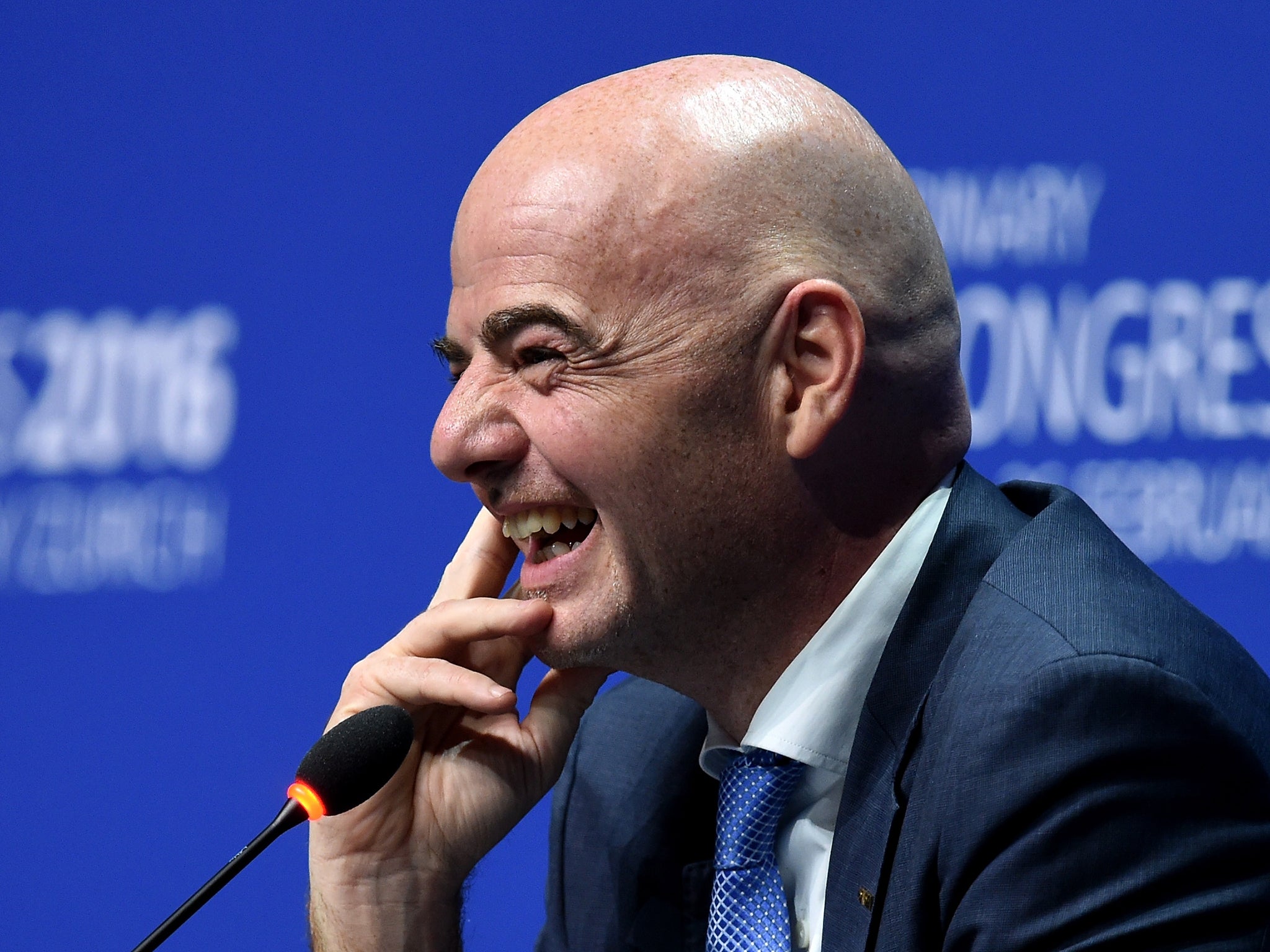Fifa election: New President Gianni Infantino vows to clean up governing body
Swiss lawyer takes football’s top job, pledging to rebuild respect for the game

Money talks, the saying goes. And it bellowed loudly during the election of world football’s top job.
Gianni Infantino, the Swiss lawyer who had promised to share more of Fifa’s wealth with his voters than his rivals, staged a remarkable coup to grab the president’s role in football’s scandal-hit governing body.
Sepp Blatter’s successor, who was backed by England’s Football Association, pledged to rebuild and win back respect for football, saying he wanted to put the game itself back “centre-stage”.
Mr Infantino, a former protégé of the suspended Uefa president Michel Platini, under whom he served as general secretary in European football’s headquarters, insisted he is not a politician but a football man who “would put the game first”.
Crucially he promised to share Fifa’s wealth, more than doubling football development grants to the 209 member associations.
“Fifa has gone through sad times, moments of crisis, but those times are over. We need to implement the reforms and implement good governance and transparency. We also need to have respect,” the 45-year-old told delegates in Zurich after his victory.
“We’re going to win back this respect through hard work, commitment and we’re going to make sure we can finally focus on this wonderful game.”
Mr Infantino takes over an organisation that is facing criminal investigations in the United States and Switzerland, which have already resulted in corruption charges against dozens of leading football officials. Fifa itself could yet face racketeering conspiracy charges.
It is also facing potentially embarrassing investigations into the awarding of several World Cup finals, especially decisions to grant the 2018 tournament to Russia and the 2022 finals to Qatar.
Swiss investigators are in addition examining scores of reports of suspicious financial activity linked to the awarding of those tournaments.
Mr Infantino only decided to stand last October, when Mr Platini was suspended by Fifa and later banned.
His campaign, backed by Europe’s footballing elite, picked up late momentum and on 26 February the Inter Milan fan comfortably defeated the pre-vote favourite Sheikh Salman bin Ebrahim al-Khalifa of Bahrain by 115 votes to 88 in the second round of voting.
Sheikh Salman, who has faced strong criticism of his human rights record, was predicted to have the biggest share of the first-round vote but trailed Mr Infantino by three votes. The majority of supporters who backed Jordan’s Prince Hussein and the French diplomat Jérôme Champagne then switched support to Mr Infantino, giving him victory.
Prior to Mr Infantino’s triumph, Fifa passed a number of significant reforms designed to root out and prevent future corruption and curb the powers of its new president.
Those include limiting presidents from serving more than three four-year terms, reducing their powers and guaranteeing more independent oversight for Fifa decision-making and spending. Its ruling body will be renamed the Fifa Council and will have more female members. There will be stricter integrity checks for senior officials.
But delegates also heard that Fifa is facing financial problems as a result of the corruption crisis. Markus Kattner, Fifa’s acting secretary general, said it was $550m (£397m) short of its financial targets and beset by morale-draining uncertainty. Fifa is facing pressure from its commercial sponsors to improve its image and performance.
It will publish its 2015 financial report next month which is expected to show a loss of at least $100m.
The former English FA chief executive Mark Palios, reacting to the victory, said: “Some nations chose not to vote with their confederations, which may be a sign of change in the bowels of the organisation.
“But the most important vote is the reforms – he will be judged on the extent he can impose those reforms. Hopefully we’ll start seeing Fifa have a positive effect on the game rather than just feeding off it.”
Critics questioned the new president’s real desire for reform. They pointed to his previous loyalty to the banned Mr Platini and Uefa’s failure to adopt reform. The influential European Clubs Association, which represents the top national club sides, called for Mr Infantino to abandon his proposal for an expanded 40-nation World Cup competition, warning it would put too much strain on top players.
The anti-corruption campaigners Transparency International said the “non-transparent” election process typified Fifa’s problem. “The fact we didn’t have public debates, that we didn’t have clarity on eligibility criteria for the candidates and so forth has limited, in a sense, public trust in the candidates and what they would actually do to reform Fifa,” said Gareth Sweeney, the chief editor of its global corruption report.
Join our commenting forum
Join thought-provoking conversations, follow other Independent readers and see their replies
Comments